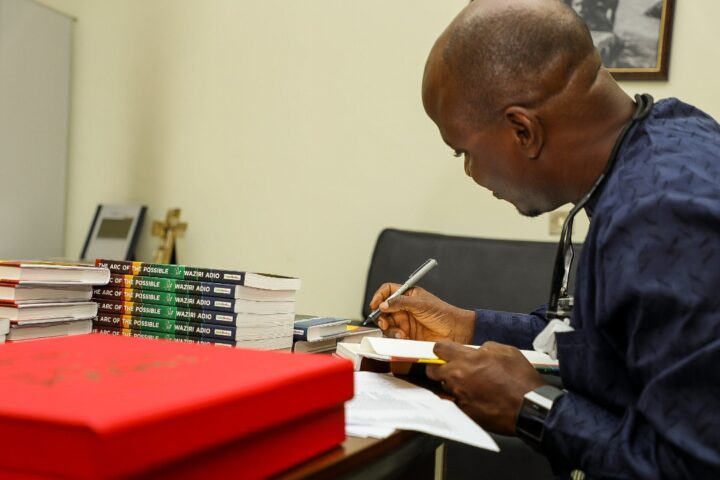Though himself a Muslim, Waziri Adio said some fellow Muslims at the Nigeria Extractive Industries Transparency Initiative (NEITI) ganged up against him when he directed that every member of staff should start logging their out-of-office movements during work hours.
He narrated the experience in ‘The Arc of the Possible’, his memoir on his tenure as the executive secretary of the government agency between 2016 and 2021.
The memoir, published by Cable Books, an imprint of TheCable newspaper, will be presented at the Shehu Musa Yar’Adua Centre, Abuja, on Saturday, December 11.
Adio gave a background to the accusation of being anti-Muslim and “violating the constitutional rights of Muslims”.
Advertisement
He said some staff were perpetual late-comers and many would disappear from their desks for hours “under the pretext of going for something not work-related”.
Despite stern warnings, he said, the attitude continued.
On a particular day, he physically took a roll call after the official reporting time of 9am and found out that less than 50 percent of the staff were at work.
Advertisement
‘LOG YOUR MOVEMENTS — EVEN IF GOING TO PRAY’
Adio directed that a query be issued to all late comers and, after repeated warnings without luck, asked the HR and Administration Department to come up with measures to address the issues.
It was at this stage, he said, that he decided to re-introduce the movement register which was there before his tenure but had been jettisoned.
Everyone, including Adio himself, was now mandated to log entries and exits, even if going for school runs or prayers outside the office.
Advertisement
“[One] person asked if the register should be signed when people go to the mosque to worship. I said yes, always. I used to go for Jumat prayers outside the office on Fridays and I always signed the register,” he wrote.
Adio said a director, who is a Christian, later approached him and suggested that Muslims should be excused, saying: “You know, religion is seen as a sensitive issue in these parts.”
‘STAFF TRICKED INTO WRITING PETITION AGAINST ME’
“I reminded him that the principle was anytime staff members, including the CEO, stepped in and out of the office, and that making an exemption for Muslims when they went to the mosque would defeat the purpose. I asked him to check the register to confirm that even I filled it when I went for Jumat,” Adio wrote.
Advertisement
“He said no one sent him but he just felt he should share his observations with me. I thanked him and said that as a Muslim, I could not in good conscience make this exemption and would be happy to discuss with any Muslim who felt uneasy about it. What he didn’t tell me was that he had been sent by some people.

“Another staff member, this time a Muslim, casually mentioned that I should consider issuing an addendum that those going to the mosque would not need to sign the movement register. I explained to him why that would be hypocritical for me, and he seemed to understand. He also didn’t tell me that some people had sent him.”
Advertisement
He said a director then tricked other Muslims into signing a petition against him and sent it to the board — bypassing the laid-down procedure.
Those who signed the petition later said they thought it was a “letter of appeal” to Adio to reconsider his position.
Advertisement
But some even threatened to report him to the National Human Rights Commission (NHRC) and the two apex Islamic organisations in the country — the Supreme Council for Islamic Affairs (SCIA) and the Jama’atu Nasril Islam (JNI).
‘ISLAM DOES NOT ENDORSE SLOTHFULNESS’
Advertisement
Two weeks before the petition was submitted to the board, Adio had met with a three-man delegation sent by the aggrieved Muslim staff.
Adio wrote: “I was a bit tired that day as this was during Ramadan, but I spent close to two hours with the members of the delegation. We had a frank meeting, and I allayed all their fears. I told them that all I wanted was for staff members to take their jobs more seriously, which I consider to be in line with the teachings of Islam.
“I shared my belief that work is actually a form of worship and that Muslims should always lead by example. I cited examples from Hadiths, from some Muslim sects, and from some Islamic countries I had been to, including my experience when I went for Umrah and Hajj in Saudi Arabia years earlier.
“I also encouraged them to talk to those who might use going for prayers as an excuse to dodge work, which would be unfair to Islam, to fellow Muslims and to the other staff members. I promised them no one would be stopped from going to worship and that the only register I was looking at was the one in the ES Office, and that I looked at it only when I was about signing. I said the register was mainly for the purpose of deterrence.”
A fortnight later, he said, the “letter of appeal” transformed into a petition that was sent to the board via an email in which he was copied.
Adio replied the email: “As you mentioned, I am a Muslim. In my admittedly limited understanding of Islam, I am yet to come across injunctions in the Quran or the Hadiths that encourage Muslims to be unprofessional, slothful, and conniving. Maybe I need to read more.”
PUBLIC PRESENTATION ON SATURDAY
There are other revelations and insights into his tenure as well as the challenges of governance in Nigeria in the ‘The Arc of the Possible’, which will be publicly presented at an event to be chaired by Aigboje Aig-Imoukhuede, chairman of the Aig-Imoukhuede Foundation and former group managing director of Access Bank Plc.
Kashim Ibrahim-Imam, Muttawalin Borno, will be the chief host while Nasir Ahmad el-Rufai, governor of Kaduna state, is the book presenter. Sharon Ikeazor, minister of state for environment, is the presenter.
The event will feature a high-level, inter-generational conversation on ‘The Promise and Perils of Public Service in Nigeria’.
On the panel are Yusuf Tuggar, the Nigerian ambassador to Germany and former federal legislator; Yewande Sadiku, former executive secretary of the Nigerian Investment Promotion Commission (NIPC); and Joe Abah, the Country Director of DAI and former director-gGeneral of the Bureau of Public Service Reforms.
The conversation will be moderated by Samson Itodo, executive director, Yiaga Africa and convener of the Not Too Young To Run movement.
You can order a copy of the book by clicking here.
Add a comment





